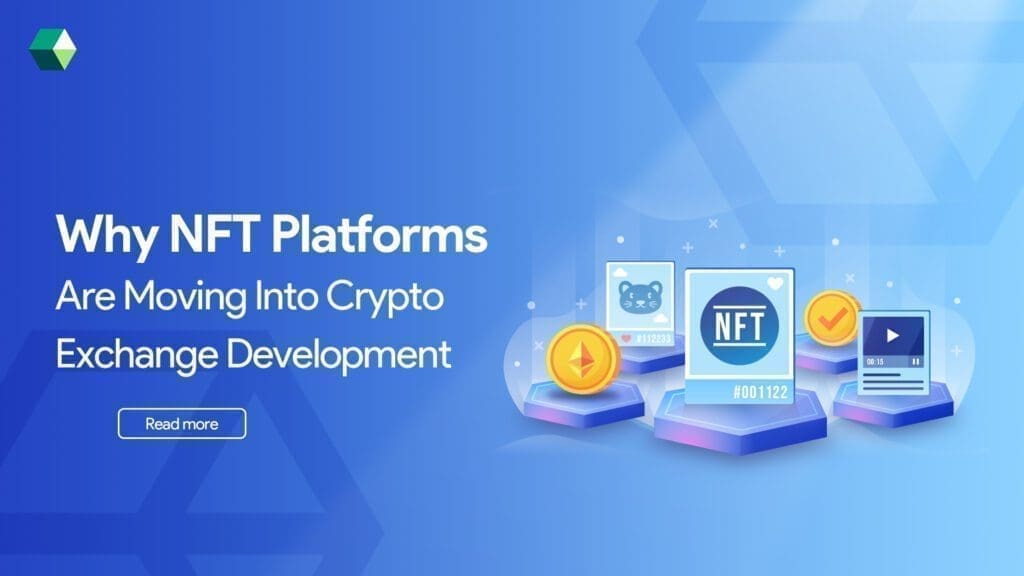
The world of digital assets has evolved at an astounding rate over the past few years, and one of the most significant developments has been the growth of NFT platforms. NFTs (Non-Fungible Tokens) have become a cornerstone of digital art, collectibles, and virtual assets, enabling creators to monetize their works in a way that was previously unimaginable. Initially, NFT platforms served as marketplaces for buying and selling NFTs, but the landscape is shifting. More and more, these platforms are transitioning into cryptocurrency exchange development.
Why are these platforms expanding their services to include token swapping, crypto trading, and DeFi functionalities? What value does it bring to users, investors, and the overall Web3 ecosystem? In this blog, we’ll explore the key reasons behind this strategic move and how it signals a new phase of growth for NFT platforms.
Understanding NFT Platforms
NFT platforms are online spaces where people can create, buy, sell, and trade NFTs (Non-Fungible Tokens). These platforms help artists, creators, and businesses turn their digital work, like art, music, or even virtual land, into unique tokens stored on blockchains. Well-known platforms such as OpenSea, Rarible, and Foundation make it easy to create and showcase NFTs, allowing people from all over the world to buy and sell them.
These platforms use blockchain technology, mainly on networks like Ethereum or Solana, to guarantee that each NFT is one-of-a-kind and owned by a specific person. Many platforms also allow creators to earn royalties every time their NFTs are resold. As the world of digital art and collectibles grows, NFT platforms offer exciting new opportunities for both creators and buyers.
The Rise of NFT Platforms in Crypto Exchange Development
-
A Need for Diversification and Growth
Initially, NFT platforms primarily earned revenue through transaction fees on the buying and selling of digital assets. However, with the increase in competition and market saturation, many platforms began to realize the limitations of relying solely on NFT transactions for revenue generation. As the digital asset market matured, the need for diversification became evident.
By expanding into cryptocurrency exchange development, NFT platforms can generate new revenue streams through trading fees, listing fees, and other related services. This is particularly important in a market where trends can change quickly, and staying relevant requires adaptation. By offering cryptocurrency exchange services, these platforms can tap into the broader crypto market and ensure long-term financial stability.
Moreover, offering a wider range of services through crypto exchange development ensures that NFT platforms can cater to both crypto traders and NFT collectors, allowing them to grow and diversify their user base.
-
A Unified Experience for Users
One of the major challenges faced by NFT buyers and sellers is the fragmented experience across different platforms. For example, to buy an NFT, users often need to acquire cryptocurrency on a separate exchange, transfer it to the NFT marketplace, and then complete their transaction. This complex process can be frustrating, costly, and time-consuming.
In response, many NFT platforms are now embracing crypto exchange software development to offer a seamless, integrated experience. With a built-in crypto exchange, users no longer need to switch between platforms to buy NFTs or trade cryptocurrencies. Instead, they can complete all their transactions within the same ecosystem.
Providing a crypto exchange platform development also ensures that users can easily convert between different digital assets, making the process smoother and more efficient. For instance, a user can purchase crypto directly on the platform and use it to buy NFTs, creating a more convenient experience that reduces friction and enhances overall satisfaction.
-
Unlocking New Market Segments
While the NFT market has exploded in popularity, it still represents a relatively niche segment within the broader cryptocurrency and blockchain space. By integrating a cryptocurrency exchange into their services, NFT platforms can attract new users who are primarily interested in cryptocurrency trading, rather than just NFTs.
Incorporating crypto exchange development services opens up opportunities to reach a wider audience, from seasoned cryptocurrency traders to new investors looking to explore the NFT space. This move increases the platform’s reach and provides more value to users who are interested in both cryptocurrencies and NFTs.
For NFT platforms, this is a smart strategy to remain relevant in a competitive market and capture a larger share of the growing digital asset ecosystem. The integration of a cryptocurrency exchange developer ensures that the platform can cater to a more diverse user base, including those who might not yet be involved in the NFT world.
-
Boosting Liquidity for NFTs
Liquidity has always been a concern for the NFT market. Unlike cryptocurrencies, which can be bought or sold quickly on exchange platforms, NFTs are unique assets with prices that can fluctuate significantly. The lack of liquidity in NFT markets has often led to challenges for buyers and sellers who want to trade their assets but struggle to find buyers or sellers at the right price.
By developing a crypto exchange development solution, NFT platforms can improve liquidity by integrating their marketplace with a crypto exchange. This allows users to sell their NFTs and immediately convert them into other cryptocurrencies, creating more options and improving the overall experience for both buyers and sellers.
Moreover, offering liquidity solutions makes NFTs more attractive to a broader audience, as users know they can easily buy or sell their assets without worrying about market fluctuations or the difficulty of finding a buyer.
-
Greater Control Over Security
Security is a top priority for any platform dealing with digital assets. Traditionally, NFT platforms have relied on external services or decentralized protocols to handle transactions, which sometimes raise concerns about security and trust. As the value of NFTs and cryptocurrencies continues to rise, so does the need for better security.
By moving into crypto exchange software development, NFT platforms can take full control over the security measures implemented on their site. This includes developing advanced encryption protocols, secure wallet management systems, and robust identity verification processes to ensure the safety of users’ assets.
With the integration of crypto exchange development solutions, NFT platforms can protect both NFTs and cryptocurrencies under the same security framework, building user confidence and reducing the risks of hacks or breaches. A more secure platform enhances the reputation of NFT platforms, ensuring that they are trusted by both casual users and institutional investors alike.
-
Accessing Institutional Investors
The increasing interest of institutional investors in digital assets, including both cryptocurrencies and NFTs, is another key factor driving NFT platforms toward cryptocurrency exchange development. Institutional investors often prefer to trade on established platforms that offer high liquidity, regulatory compliance, and robust security measures.
By adding a crypto exchange development company to their offerings, NFT platforms can attract institutional investors who are looking for a secure, integrated platform to trade both NFTs and cryptocurrencies. This can open doors to new revenue streams, as institutional investors typically bring large volumes of capital and greater stability to the platform.
Furthermore, crypto exchange platform development positions NFT platforms to capture a more significant share of institutional investment, helping them expand their business and stay competitive in the digital asset space.
-
Seamless DeFi Integration
The rise of Decentralized Finance (DeFi) has added a new layer of complexity and opportunity for both NFTs and cryptocurrencies. DeFi protocols enable users to engage in lending, borrowing, staking, and yield farming, among other activities. These services add significant utility to digital assets beyond simple buy-and-sell transactions.
NFT platforms with integrated crypto exchange software development can leverage DeFi capabilities to introduce new use cases for NFTs, such as staking NFTs for rewards, using NFTs as collateral for loans, or creating NFT-based liquidity pools. This further enhances the value and appeal of NFTs, attracting a wider audience of DeFi enthusiasts and crypto traders.
Integrating crypto exchange development solutions with DeFi protocols helps NFT platforms stay ahead of the curve, offering innovative services that create new revenue streams for both the platform and its users. It also makes NFTs more versatile and practical, increasing their utility in the broader decentralized ecosystem.
-
Developing a Competitive Edge
As the NFT market grows, platforms are increasingly looking for ways to differentiate themselves from the competition. With the proliferation of NFT marketplaces, offering something beyond just a place to buy and sell digital assets is essential for standing out.
By moving into crypto exchange platform development, NFT platforms can position themselves as comprehensive digital asset hubs, providing services for both NFT collectors and cryptocurrency traders. This diversification allows them to attract users from both markets, strengthening their position in an increasingly competitive space.
A well-integrated cryptocurrency exchange development feature helps NFT platforms to provide a broader range of services, increasing user engagement and fostering long-term loyalty. This type of strategy positions the platform for future growth and success as the market evolves.
-
Technological Synergies and Cost Efficiency
NThe technology behind NFTs and cryptocurrency exchanges shares many similarities, especially when it comes to blockchain infrastructure, smart contracts, and decentralized protocols. NFT platforms already have experience with these technologies, making the transition into crypto exchange development solutions relatively seamless.
By leveraging existing expertise, NFT platforms can develop a cryptocurrency exchange more efficiently and cost-effectively. This synergy not only reduces development costs but also accelerates the time to market, allowing platforms to scale more quickly and offer new features to users without reinventing the wheel.
Moreover, integrating a cryptocurrency exchange development feature enhances the platform’s ability to serve a broader audience, ensuring that both NFTs and cryptocurrencies can be traded in one unified environment.
Join the Platform that Does Both – NFTs and Crypto!
NFT platforms are increasingly moving into crypto exchange development to diversify their revenue streams, offer a unified user experience, enhance liquidity, and improve security. By integrating cryptocurrency exchanges with their existing NFT marketplaces, these platforms are positioning themselves for long-term success in the rapidly evolving digital asset ecosystem.
This strategic shift allows NFT platforms to cater to a broader audience, including both NFT enthusiasts and crypto traders. With greater control over security, enhanced liquidity, and new opportunities for DeFi integration, NFT platforms that embrace cryptocurrency exchange development are setting themselves up for continued growth and success in the digital asset space. For users, this means a more streamlined, secure, and efficient experience that supports the growth and innovation of both NFTs and cryptocurrencies.






